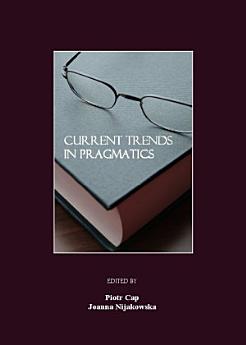Current Trends in Pragmatics
Piotr Cap · Joanna Nijakowska
មីនា 2009 · Cambridge Scholars Publishing
5.0star
ការវាយតម្លៃ 1report
សៀវភៅអេឡិចត្រូនិច
430
ទំព័រ
family_home
មានសិទ្ធិ
info
reportការវាយតម្លៃ និងមតិវាយតម្លៃមិនត្រូវបានផ្ទៀងផ្ទាត់ទេ ស្វែងយល់បន្ថែម
អំពីសៀវភៅអេឡិចត្រូនិកនេះ
The volume brings together twenty articles written by established linguists, language philosophers, sociologists and psychologists, sharing their academic interest in a broad and interdisciplinary field of linguistic pragmatics. The collection consists of four thematic parts: “Pragmatics and Cognition,” “The Semantics-Pragmatics Interface,” “Conversational and Text Analysis” and “Pragmatics, Social Research and Didactics.” It aims to contribute to the debate on the present-day status of pragmatics, by examining three fundamental issues. The first involves the question of the current explanatory power of pragmatics, namely, how successful is the existing apparatus of pragmatics and the basic-level parameters (theories of speech acts, relevance, implicature, presupposition, deixis, politeness, etc.) in the elucidation of various aspects of meaning. The second issue involves the methodological assistance that pragmatics might need in order to enhance its explanatory power. The third has to do with the fuzzily defined boundaries of the discipline of pragmatics and the resulting temptation for analysts to concentrate solely on its fragmented sub-domains. As the collection unfolds, these issues form a continuum which, it seems, is often a process that a linguist goes through as his or her methodological awareness deepens. Thus, the orientation of the volume towards the analyst and the analytic mind-set, as well as the attempted balance in presentation of the alternative approaches, seem the major theoretical characteristic of the book.
ការដាក់ផ្កាយ និងមតិវាយតម្លៃ
5.0
ការវាយតម្លៃ 1
អំពីអ្នកនិពន្ធ
Piotr Cap is Associate Professor and Head of the Department of Pragmatics at the University of Łódź, Poland. He has been research fellow at UC Berkeley, Birmingham University, the University of Munich and Boston University. His interests are in pragmatics, political discourse and methodology of linguistics. His book publications include Explorations in Political Discourse (Lang, 2002), Pragmatics Today (Lang, 2005) and Legitimization in Political Discourse (CSP, 2006). He is editor of the international journal Lodz Papers in Pragmatics (LPP).
Joanna Nijakowska is Assistant Professor in the Department of Psycholinguistics and Language Didactics at the University of Łódź, Poland. She specializes in the psychological, neurolinguistic and pragmatic aspects of language comprehension and processing. She has lectured at several European academic centers, including the University of Tampere, the University of York and Manchester University.
វាយតម្លៃសៀវភៅអេឡិចត្រូនិកនេះ
ប្រាប់យើងអំពីការយល់ឃើញរបស់អ្នក។
អានព័ត៌មាន
ទូរសព្ទឆ្លាតវៃ និងថេប្លេត
ដំឡើងកម្មវិធី Google Play Books សម្រាប់ Android និង iPad/iPhone ។ វាធ្វើសមកាលកម្មដោយស្វ័យប្រវត្តិជាមួយគណនីរបស់អ្នក និងអនុញ្ញាតឱ្យអ្នកអានពេលមានអ៊ីនធឺណិត ឬគ្មានអ៊ីនធឺណិតនៅគ្រប់ទីកន្លែង។
កុំព្យូទ័រយួរដៃ និងកុំព្យូទ័រ
អ្នកអាចស្ដាប់សៀវភៅជាសំឡេងដែលបានទិញនៅក្នុង Google Play ដោយប្រើកម្មវិធីរុករកតាមអ៊ីនធឺណិតក្នុងកុំព្យូទ័ររបស់អ្នក។
eReaders និងឧបករណ៍ផ្សេងទៀត
ដើម្បីអាននៅលើឧបករណ៍ e-ink ដូចជាឧបករណ៍អានសៀវភៅអេឡិចត្រូនិក Kobo អ្នកនឹងត្រូវទាញយកឯកសារ ហើយផ្ទេរវាទៅឧបករណ៍របស់អ្នក។ សូមអនុវត្តតាមការណែនាំលម្អិតរបស់មជ្ឈមណ្ឌលជំនួយ ដើម្បីផ្ទេរឯកសារទៅឧបករណ៍អានសៀវភៅអេឡិចត្រូនិកដែលស្គាល់។







